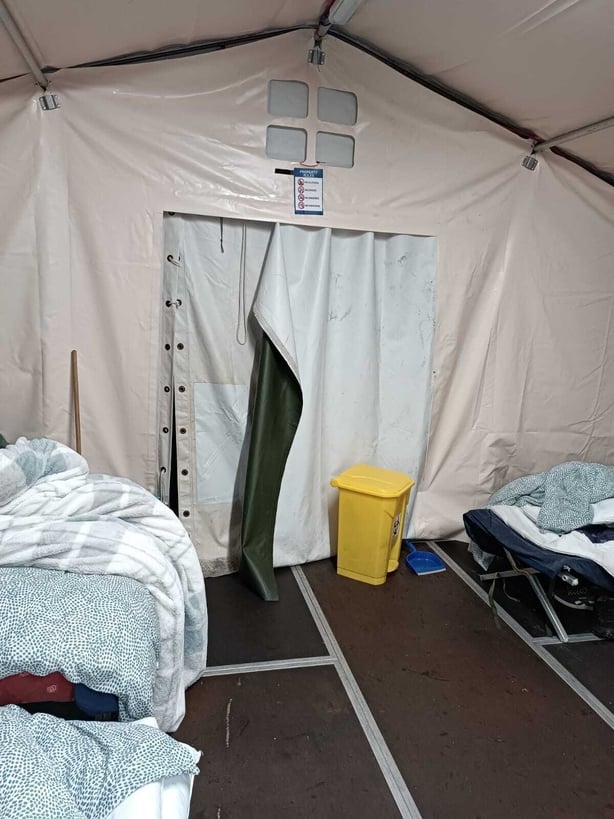It is late in the evening when John walks along the path on the grounds of what was once the Central Mental Hospital.
To one side there is a line of large green military tents, to the other lie the largely abandoned former hospital buildings.
"These are empty buildings, empty rooms, an empty house, nobody is inside it," John said, "but they choose to keep us here," he added, pointing the camera on his phone towards the tents.
The name John is a pseudonym that we have given him to protect his identity.
His is one of 319 asylum seekers who were moved into the site in Dundrum in Dublin since it opened in August.
When John arrived in Ireland earlier this year to seek asylum he slept rough because of a shortage of accommodation.
"Now I am being brought back to homelessness, I think this is more of being homeless," John said of living in the tent.
John said that he and other residents are frustrated that they must stay outside in tents, while buildings lie empty alongside them.
"The old building would be very much better than this tent because most nights, we don't sleep, we're very cold," he explained.
"Even as I am talking to you now, my hands are freezing," he added.

John believes that he and his fellow residents at the facility could make the buildings habitable.
"They are good buildings... maybe we can do volunteer and clean it up and use it, we are ready for it," John said.
In the meantime, John sleeps in a tent with seven other asylum seekers on cot beds with one heater between them for warmth.
"This is how I sleep, I am having three trousers, two inner shirts, then two jackets and two stockings," he explained to me during a video call, unzipping his outer jacket to show me the layers of clothing underneath.
"The hardest thing is the cold and the stretcher (bed), because with this stretcher, we cannot even sleep nice," he said, "my back will be aching me because I am sleeping on a rod."
The toilets and the showers are some distance from the tents, and sections of the path to them appear dimly lit, with at least one light not working along the way.
John tells me that they use the torches on their phones when they need to use them late at night.
He has been in a tent at the Dundrum facility for more than a month, but he says that he has not been given any indication as to how long he and others will have to stay there.
"They keep on saying we are going to stay here temporarily, but they are still building more tents for people to come in."
John recently got his work permit and has started a job.
He hopes to save money, but feels that finding somewhere else to stay will prove very difficult.
His first pay cheque came to €400, "so it's not really much to get a house in Ireland," he said.
He described how he usually wakes around 5am to get ready for work.
"It is very cold early in the morning so I can't bath. I just go to work... then maybe when I come back from work I can have my shower," he said.
"It's very depressing," John said, adding that "if I wasn't running for my life" he would have gone back home.
Responding to a query from RTÉ News, a spokesperson from the Department of Children, Equality, Integration, Disability and Youth said that "due to the emergency nature of the accommodation crisis, it is not possible to state what the average length of stay is for residents" in tents.
The spokesperson said that "during periods of heavy rain or strong winds, all tent entrances are securely sealed to prevent any water ingress, ensuring residents remain dry and safe."






